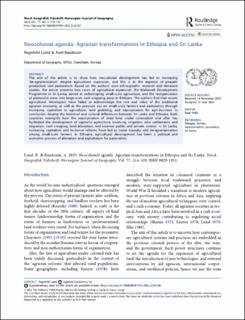Neocolonial agenda: Agrarian transformations in Ethiopia and Sri Lanka
Peer reviewed, Journal article
Published version
Permanent lenke
https://hdl.handle.net/11250/3104727Utgivelsesdato
2023Metadata
Vis full innførselSamlinger
- Institutt for geografi [1119]
- Publikasjoner fra CRIStin - NTNU [38679]
Sammendrag
The aim of the article is to show how neocolonial development has led to increasing ‘de-agrarianisation’ despite agricultural expansion, and this is at the expense of peasant production and pastoralism. Based on the authors’ own ethnographic research and literature studies, the article presents two cases of agricultural expansion: the Mahaweli Development Programme in Sri Lanka, aimed at redeveloping small-scale agriculture, and the reorganisation of pastoralist areas into large-scale cash cropping areas in Ethiopia. The authors find that recent agricultural ‘developers’ have failed to acknowledge the role and value of the traditional agrarian economy, as well as the pressure put on small-scale farmers and pastoralists through increasing capitalism in agriculture, land grabbing, and expropriation for agri-business. In conclusion, despite the historical and cultural differences between Sri Lanka and Ethiopia, both countries exemplify how the expropriation of state land under colonialism and after has facilitated the development of capitalist agriculture, involving irrigation, new settlements and migration, cash cropping, land alienation, and external public and private control. In Sri Lanka, increasing capitalism and technical reforms have led to social inequity and de-agrarianisation among small-scale farmers. In Ethiopia, agricultural development has been a political and economic process of alienation and exploitation for pastoralists.

